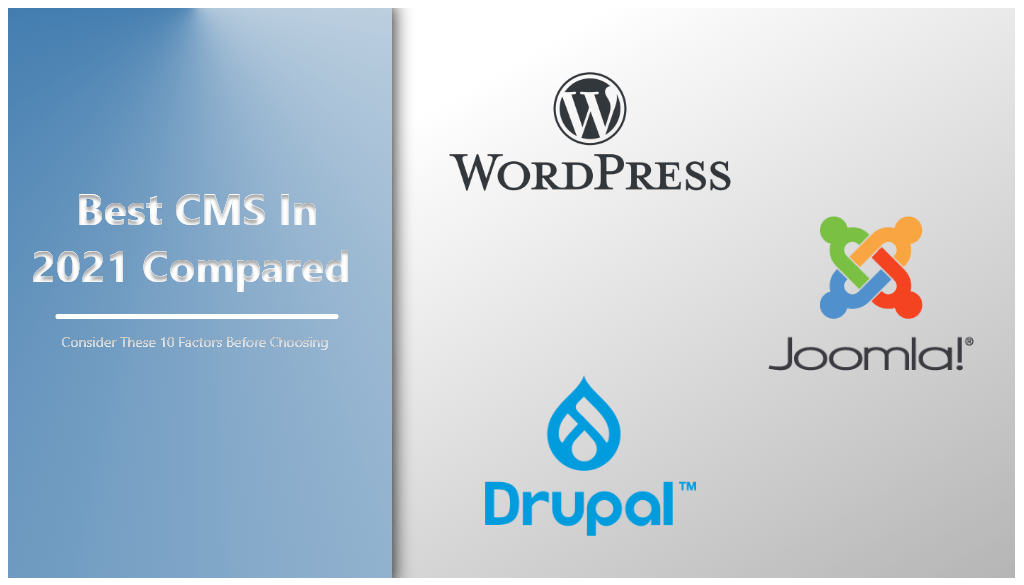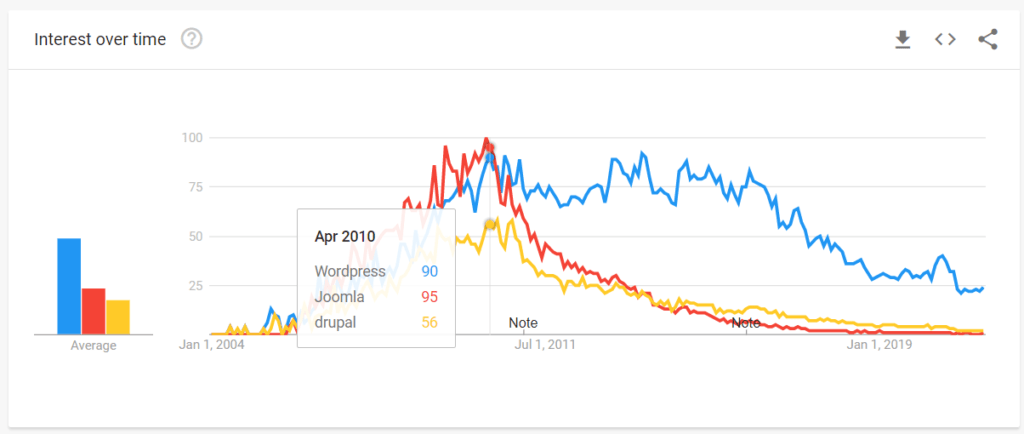Best CMS in 2021 Compared – Consider these 10 factors before choosing

Content Management System (CMS) fired away the day the internet came into existence and has developed with its companion over the period. A CMS has a myriad of add-ons and tools in the arsenal to build a fully equipped website and customize it as per your preferences. With the increasing number of websites, CMS has become the need of the hour with various businesses, bloggers and other organizations urging to have their website. Do you have your business/individual website, integrated with a CMS to cater to the accelerating number of audiences online?
You may prefer free consulting from our professionals for Content Management System services to develop a new website or upgrading your existing website. Sankey Solutions have rich expertise in providing CMS services to various industries and have developed systems for some of the pioneer media houses in India.
The market is exceptionally dominated by the paramount WordPress (WP). As of January 2021, it holds a 64.9% market share among the websites that has integrated CMS. Whereas, the trail of its competitors – Joomla and Drupal has a single-digit share in the market.
In the trail, we have Joomla with a 3 .2% market share which was pulled behind by Shopify to take the #2 position. The third formerly big player alongside these two CMS is Drupal holds 2.3% of the pie. The following chart shows search popularity of WP, Drupal and Joomla since 2004 till date:

Let us get into the comparison of the three CMS competitors and understand various factors that differentiate them.
1. Ignition to Building:
WordPress is the easiest of all, to begin with, the procedure goes as follows – create your account, add your business/individual details, enter your site name and get a domain. That’s it you are all set to create your website with WP tools. As simple as that!
Whereas, Joomla and Drupal require downloads and installation of the software along with certain configuration setting with the WampServer to complete the task. It might demand professional guidance if you don’t possess any web development knowledge, post that you can create your website.
2. Expertise:
Today numerous aspirants want to sell their products, provide their services, or share ideas with their audience. While there is such a high demand for a website, it mandates the CMS providers to cut down users’ hassle for creating one.
With WordPress it’s just a matter of minutes to build your website, it doesn’t take hours and hours of toiling to get it started. New and inexperienced users can create their blogs page or website with the WP Dashboard which has Pages, Media, Blogs and several other tabs which are as easy as a pie.
Post-installation, Joomla follows similar steps to form the website, but the dashboard for creating the website is not as comprehensible as WP. A user might perceive the greater number of tabs as an advantage over WP’s simplicity but it’s the other way around.
Talking about Drupal here the initial process is identical to the other two CMS but the dashboard feels more complex which doesn’t emerge to be user-friendly relatively to its rivals.
3. Hosting Servers:
Hosting servers play an important role while selecting one of the CMS platforms as your site speed and up-time depends on the hosting server.
WordPress has some of the best hosting servers such as Bluehost, HostGator, Hostinger, Siteground, A2Hosting and many more. While it personally recommends Bluehost, Dreamhost and Siteground. Joomla has matching options available with few replacing the others such as HostPapa. While Drupal has some uncommon hosting servers such as Acquia, Pantheon, NameHero and a few more.
BlueHost, Siteground, and A2hosting are the common amongst the three platforms and have good speed and cost benefits. Users may choose as per their preferences and budgets.
4. Costs and Pricing:
Though you can create a website for free, we need to consider the costs of hosting services, personalized domain names and plug-ins. Domain name costs ~ $ 10-12/year applicable to any of the platforms you choose.
For WordPress the cost of hosting averages at ~ $ 3.55/Mo. Wherein the case of Joomla it boils up to ~ $4/Mo and for Drupal, the average is around $4.3/Mo.
Cost of plugins & themes for the website starts from zero and ranges:
- WordPress: Up to $200 & $250
- Joomla: Up to $70 & $200
- Drupal: Up to $100 & $80
Hence, bare minimum cost will estimate at:
- WordPress: $12 + $3.55 * 12 Mo = $54.6/year
- Joomla: $12 + $4 * 12 Mo = $60/year
- Drupal: $12 + $4.3 * 12 Mo = $63.6/year
P.S. – The minimum cost might fluctuate based on the hosting services and domain name that you would choose.
5. Add-ons and Themes:
Plug-ins are the upgrades available for your website to augment the functionalities and features of the website. The only drawback of plug-ins is that the site loading speed cuts back.
Currently, WP has a striking number of 50000+ Plug-ins (Free & Paid) to enhance your website’s performance and raise the bar of user experience.
Whereas, Joomla has termed the add-ons as website “extensions”. Joomla has approximately 8000 extensions to offer to its customers.
While, Drupal has noticeable 44000+ modules that is a number capable of competing with WordPress, unlike Joomla.
6. Designs and Templates:
Designs and themes variety magnifies the appearance of the website that is significant for portraying your brand’s image. WordPress gives you a huge catalogue of 8000+ free themes, Joomla doesn’t have a dedicated section for templates but with some searches, you might find some third-party Joomla templates (mostly paid) and finally, Drupal has over 2900+ themes for your website design.
7. SEO Friendliness:
Search Engine Optimization (SEO) is the principal process for driving relevant traffic to your website. SEO is the fuel to the website’s engine that boosts its success by enabling web crawlers to rank the website on the search engine results page.
WordPress has various plug-ins for SEO such as Google Sitekit and Yoast SEO being preferred by the website owners.
Joomla has its built-in and ready SEO dashboard for its customers, they need not install any of the extensions for that purpose.
Talking about Drupal, SEO is one of the core features of the platform and has a comprehensive Support feature for the customers.
8. Multi-lingual:
Joomla does an excellent job with a built-in feature for multiple languages. The administrator need not require to install any extensions the languages option will appear in the extension tab as default.
The other two competitors do not feature any pre-installed solution but there are add-ons to make it multi-lingual. WordPress has extensions with up to 57 non-English languages. Drupal has modules where the admin can change the language of the development interface making website building handy.
9. Security & Updates:
WordPress provides automated regular updates to the website administrator for both the core and any plug-ins update so that they can reinstall or update it. WP’s minor updates come once in 2 months roughly. According to Sucuri, in 2019, 94% of the attacked websites were from WP. Major reasons being hosting services plug-ins and outdated websites. Ensure that you have automated backups and two-step admin authentication.
Joomla version updates can be expected once a year whereas minor updates are injected on an average every month. Drupal Security and bug fix updates come out once a month whereas major core updates can be expected twice a year.
In terms of security Joomla and Drupal, both have a significantly lower proportion of cyber-attacks reports as compared to WordPress with 2.5% and 1.28% respectively.
10. Support and Forums:
WordPress has its support system on its official website where you can find various guides and documents to understand WordPress. WordPress also has a forum where the WP community and other web administrators share their problems and receive answers from the experts.
Similarly, Joomla has its community portal which includes blogs, updates and user groups of various countries on their official website. Also, have a forum for platform announcements followed by the Q&A section.
Drupal not lacking anywhere in terms of community, support and forum follows identical protocol.
Conclusion:
To wrap up, we believe that all the 3 CMS can do wonders for creating your website. Each of the three has its pros and cons as we have discussed above in detail explaining 10 vital variables.
WordPress, is recommended for a neophyte to web development or have no knowledge about it, don’t worry WP would not disappoint you. With the huge repository of themes, templates, plug-ins and hosting servers, you can apply various combinations to build your website. Some of the famous websites built on WordPress are Play Station, Bloomberg Professional, BBC America, Star Wars Blog and many more. It is preferable for simple blogs, articles and few paged websites.
Joomla, stands between pro-developer Drupal and pro-neophyte WordPress. While it is not as user-friendly as WP, some basic information about the development can prove to be a huge advantage for the new users. Some of the Joomla clients are IKEA, Harvard University, Linux, Holiday Inn and Lipton Ice Tea. You can choose Joomla if you require slightly complex website features like customized e-commerce programming.
Drupal, can build some of the most advanced and compound functioned websites which might not be possible with WordPress due to its user-friendliness. It is known for its powerful and robust system that can handle complex content. Tesla, the Australian Government, NASA, ABS-CBN News and Emmy Awards are in the clientele list of Drupal. These names can indicate the kind of power that Drupal possesses.
For sharing your views, suggestion or need for free consultations, please reach out to us. We will be pleased to answer your queries.